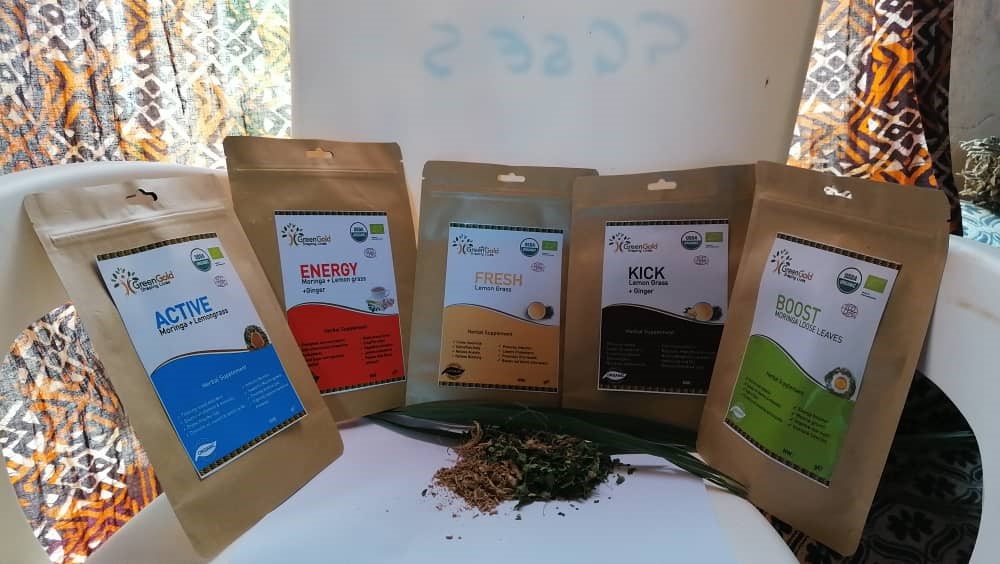This week’s B&FT’s Inspiring Startups features a young couple who are using the Moringa plant to promote healthy living in his community and beyond. Beyond that, they have employed the use of technology that naturally restores lost nutrients to the soil to support plant growth. Read how it all started as Clement, the main brain behind the project, shares his story with us.
Clement Matorwmasen is a native of Dambai in the Oti Region of Ghana, but grew up in Tamale. After completing Senior High School, he couldn’t advance further due to economic hardship – but he was not ready to become a ‘nobody’ in life. So, a few years later after gathering some money from little businesses he did, he enrolled in a computer school where he obtained a diploma. On completion, he got a job at the same computer school as a teacher
During that period, the school proprietor once used the Moringa plant to share a sermon with the students. That was the first time Clement had ever heard about the plant. So, after the lecture, he went to the Internet and read up on the plant and its uses, and saw it had a lot to offer – especially, in nutrition.

The Moringa ‘fever’ catches on
From that time, he took keen interest in the Moringa plant and wanted to champion it in the community and its environs, since most of the kids he saw were malnourished. One of the students at the computer school took him to Bolgatanga where the plant was available in abundance. He engaged the chiefs and elders and started educating them on the plant.
But he took a step further. He processed it into powder and distributed it to clinics and an orphanage for free. Around the same time, he met Femke – a Dutch lady who had come for an exchange programme and would later become his wife and business partner.
In 2011, the two love-birds got married and she relocated to Ghana, where she is now a lecturer at the University for Development Studies and a medical consultant at the Tamale Teaching Hospital. They set up an NGO called Drive Aid Ghana, aimed at ending malnutrition in his community and beyond by using the Moringa plant.
The main strategy was getting farmers to plant the Moringa, encourage its consumption and help fight malnutrition. The farmers initially bought into it – but later started cutting down the trees to the surprise of Clement and his wife. When he asked the farmers, they complained of not having any economic benefit from planting that tree; hence, cutting them for firewood, among others.
Clement and his business partner decided to change their game plan. They decided to set up a social enterprise called Green Gold. The strategy was that they would set up a Moringa farm by themselves and buy from the local farmers who would plant, process and package them into tea, cosmetics and other products and export. Since 2016, this has been the business model they are running.
But in 2019, they realised another problem. They saw that some lands lacked the required nutrients to support plant growth, especially the state lands scattered across the country which have been left unattended for so many years. So, they wanted to find a solution that would bring up the soil’s PH level to support agriculture. Through his frantic search, he met a friend who showed him a video of someone in Brazil who was restoring land naturally by using a process called syntropic agriculture, which turned a desert land into a fruit forest. He immediately embraced that method and started reading and researching about it.
Fortunately, they were able to get some experts from the Netherlands to come and educate them on the process and how to apply it. With that knowledge, he applied to authorities to use a deserted state land near Dambai, Oti Region, to plant Moringa together with other plants for processing into packaged foods or cosmetics. So, from October 2019 they started with restoration work on a 1,000-acre parcel of land. At the moment, they have recovered about 60 percent of the land – which can now support the life of every plant.
Vision
Clement says the vision is to set up what he calls satellite farms around the country – meaning he wants to use the same technology to naturally restore lands in other areas of the country which can no longer support plant growth
Challenges
The main challenge is the disconnect between funding and returns. To this point, they have invested about €5million into the farm and processing factory but are yet to make the returns. Meanwhile, they have about 120 staff they employ directly and indirectly, and all these people must be paid at the end of the month.
Another challenge is the slow process of certifying their products to get them on the market. It is both expensive and time-consuming to acquire the needed certification, he said.
The impact of coronavirus
Prior to the coronavirus pandemic, Green Gold Social Enterprise exported some of its products outside the country. But due to border closures and restrictions on trade that market is no longer existent, leading to a slump in revenue. This has resulted in cutting down the number of staff they engaged in the business.
How he is dealing with it
It is said that when one door is closed another will open. So, rather than sit idle and cry over the problem, Clement says they have turned to the local market to keep the business running, even though it has come with reducing the price of their products.
How GCIC has helped
The Ghana Climate and Innovation Centre (GCIC), Clement says, has been of enormous support to the company. The organisation has built their managerial capacity up and helped them appreciate high standards in the production process, which has improved their efficiency.
How education has helped
For Clement, his training in IT has proved very beneficial for the business, as without it the business would not have developed to this level. His IT background helped him appreciate the value of online marketing through the website and social media platforms. Through this media, the business had secured some contracts and gotten a lot of customers.
How government can support
One support that Clement feels government can implement is to set up policies that will support and push agriculture businesses which are supporting the environment. The policy, he says, must support such companies with the needed resources to push green businesses forward.
Advice for young entrepreneurs
“For me, my simple advice to young people who want to be entrepreneurs is that they should just start it. It doesn’t require that you have all the resources before you are able to do that. If you don’t start, no one will invest in an idea that you have not implemented. Starting gives an extra assurance to people that you are serious about what you are doing.”
Contact: 024 753 0020










